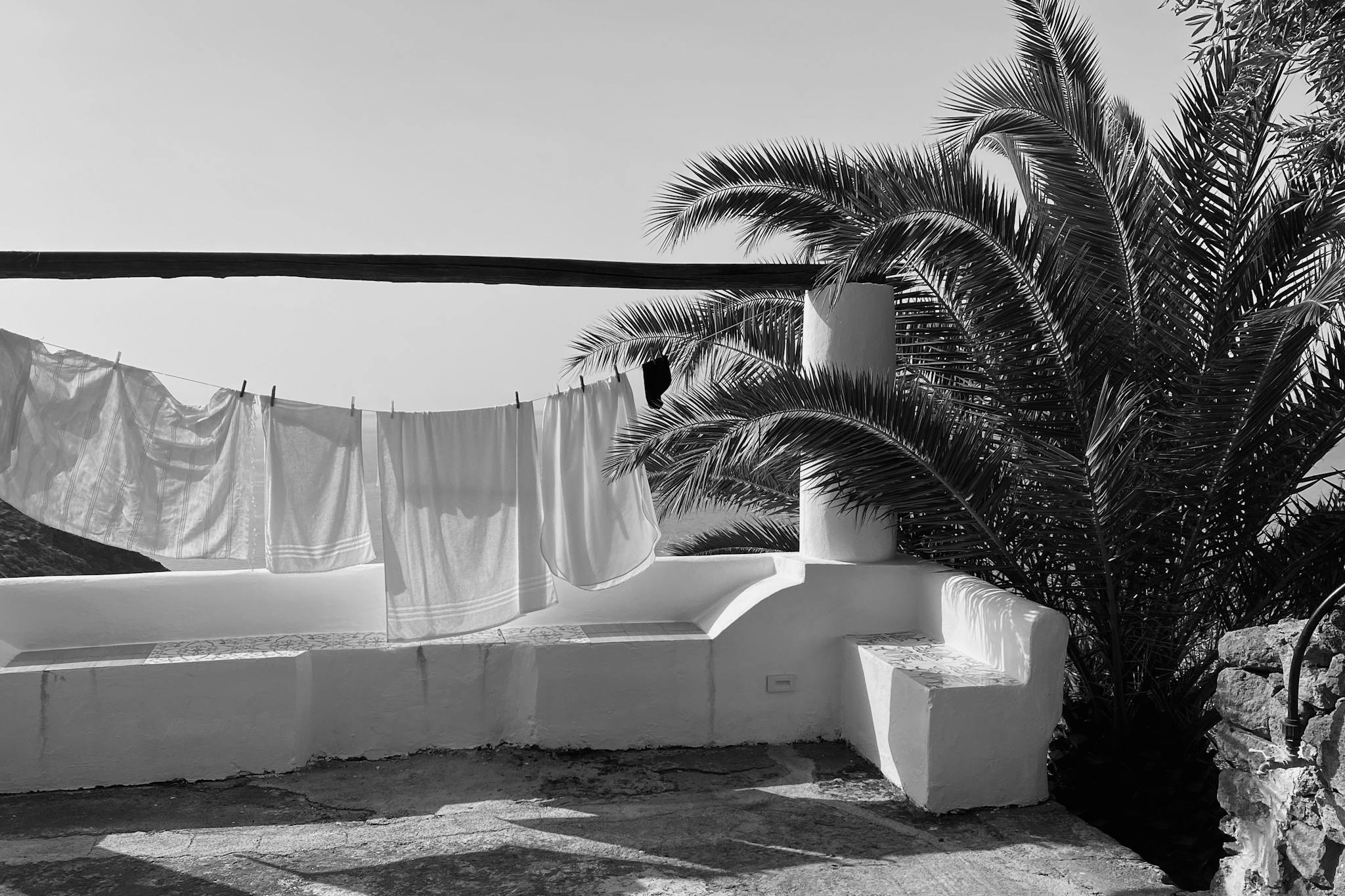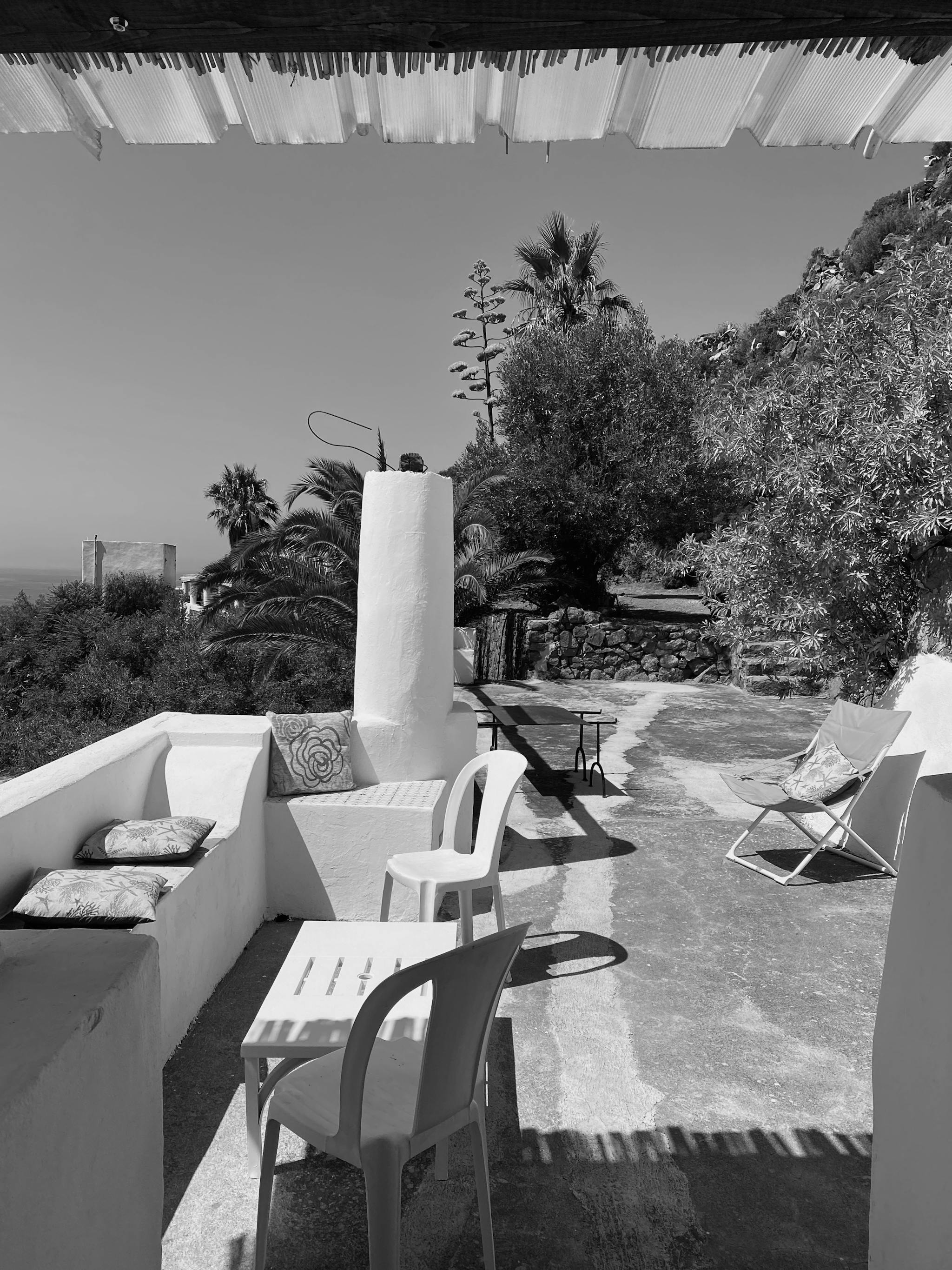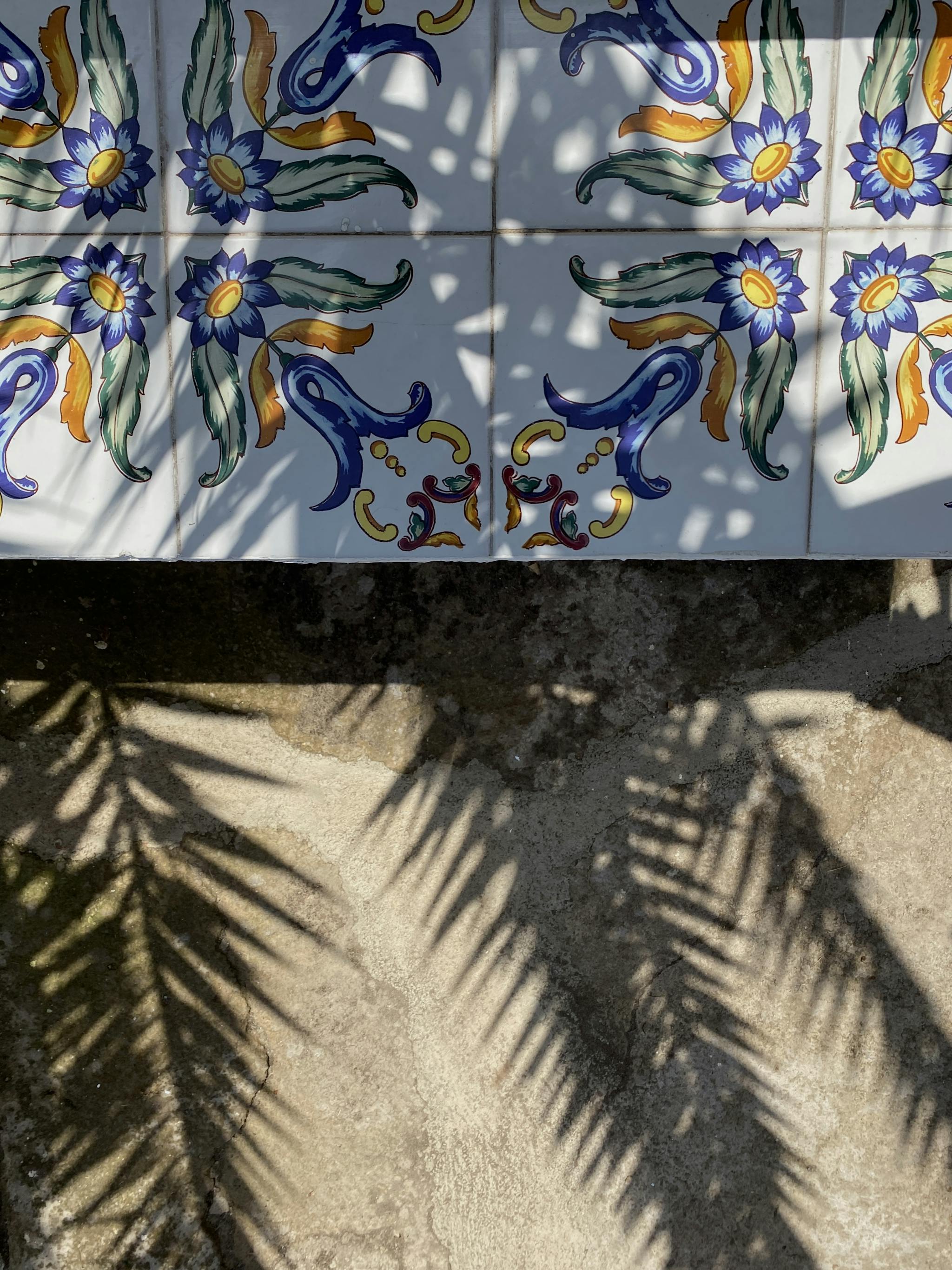
I can still remember the feeling of the cool morning breeze on my skin, blowing through the wide-open window, the curtains swaying softly before the dark morning sky. In the room next door, K is still sound asleep. Somewhere in the distance there was the roaring of a boat engine or the bark of a dog. Other than that, silence. A silence full of promise, full of happiness, full of peace. I can still remember it all.
Filicudi. An island paradise that is defined by the lack of everything. Because in the absence of choice, so I have learnt, the mind stops spinning. At least mine does. Those who can’t have don’t need, if you will, just like those who don’t know tend to not care. There isn’t a lot to know about Filicudi, and hardly anything to do on it. And that is precisely where its magic lies.
Ich erinnere mich noch genau an das Gefühl der kühlen Morgenluft auf meiner Haut, wie sie durch das weit geöffnete Fenster wehte, die Vorhänge tanzten langsam vor dem dunklen Morgenhimmel. Im Zimmer nebenan schläft K, tief und fest und noch Stunden. Irgendwo in der Ferne tuckert der Motor eines Bootes, bellt ein Hund. Ansonsten: Stille. Eine Stille voller Möglichkeiten, voller Zufriedenheit, voller Frieden. Ich erinnere mich noch so genau.
Filicudi. Eine Insel, ein Paradies, definiert vor allem durch all das, was fehlt. Denn im Mangel an Optionen, so habe ich gelernt, hört der Kopf auf, sich zu drehen. Zumindest meiner. Wer nichts haben kann, braucht auch nichts – so wie der, der nichts weiss, sich mit vielem nicht zu beschäftigen braucht. Über Filicudi gibt es wenig zu wissen, und noch weniger gibt es dort zu tun. Und genau darin liegt die Magie.


One of the seven Aeolian Islands, Filicudi counts exactly three villages—Pecorini a Mare, Filicudi Porto, Valdichiesa, all connected by mule tracks and narrow roads—and a stunning total of approximately 300 permanent residents. A good 75% of the island is protected. Mediterranean scrub, wild fennel, mint, capers, and olive groves. Bushland, dry and rugged. And all around it the bright blue sea.
We chose an Airbnb high above Pecorini a Mare, a small apartment that was exactly as the island itself: the bare necessities. A spartanic outdoor kitchen, two bedrooms with windows facing the sea, a small bathroom so unremarkable I can’t, for the life of me, remember what it looked like. All I remember is my bed with the fan beside it, pointing right at my head. And our dining table, outside beneath a pergola. The plastic chairs on which we spent hours doing nothing of importance. We ate, we read, we sat musing. We drank wine, sometimes we played games. Our eyes, sometimes on each other, but mostly on the ocean.
Unter den sieben Äolischen Inseln gilt Filicudi als eine der ursprünglichsten. Gerade mal drei Dörfer – Pecorini a Mare, Filicudi Porto, Valdichiesa –, verbunden durch Maultierpfade und schmale Strassen. Rund 300 ständige Bewohner. Drei Viertel der Insel stehen unter Naturschutz, Macchia, wilder Fenchel, Minze, Kapern, Olivenhaine – trockenes, karges Buschland. Und rundherum: das tiefblaue Meer.
Wir hatten uns ein Airbnb hoch über Pecorini a Mare ausgesucht – eine kleine Wohnung wie die Insel selbst: von allem nur so viel wie nötig. Eine Aussenküche, zwei Schlafzimmer mit Fenstern zum Meer, ein kleines Bad – so unscheinbar, dass ich mich beim besten Willen nicht erinnern kann, wie es aussah. Woran ich mich erinnere, ist mein Bett und an den alten Ventilator daneben, direkt auf meinen Kopf gerichtet. Und an unseren Esstisch draussen unter der Pergola. Die Plastikstühle, auf denen wir Stunden verbrachten, ohne irgendetwas von Bedeutung zu tun. Wir assen, wir lasen, wir sassen einfach da. Wir tranken Wein, manchmal spielten wir. Unsere Blicke streiften manchmal einander, doch ruhten meistens auf dem Meer.

Filicudi is silence, stone, and time.

The days were hot, boiling hot. We spent them down by the water, sitting leaned against a rock with our books, hip deep in the sea. Every so often I would let my body slide down, dip my hair in the shallow water; the cool around my head was restorative in a way that needs to be felt to be truly understood. And every other now and then, when the head alone wasn’t enough, I would leave my book face-down on the rock and swim out among the boats, float in silence, mesmerised by the deep blue of the sea against the forever pale white of my own skin. I think K did the same, but I couldn’t even tell.
Die Tage waren heiss. Brütend heiss. Wir verbrachten sie unten am Wasser, mit dem Rücken an die Felsen gelehnt, Bücher in der Hand, hüfttief im Meer. Hin und wieder liess ich meinen Körper fallen, tauchte die Haare ins flache Wasser – die Kühle um meinen Kopf war auf eine Weise heilsam, die man fühlen muss, um sie zu begreifen. Und wenn das nicht reichte, liess ich mein Buch offen auf dem Felsen liegen, schwamm hinaus zwischen die Boote, trieb schweigend, gebannt vom tiefen Blau des Wassers gegen das fast Weiss meiner Haut. Ich glaube, K tat dasselbe.


Only after the sun started its descent did we leave the water, walked up to La Sirena, and sat down on the boiling hot stone-tiled piazza out front. K drank, I drank, and, for the first hour or so, complained excessively about the heat. We watched others and watched others watch others. We drank wine and sometimes beer, and once the bay had gone dark and the excessive sweating, for that day, had stopped, we ate—late, as Italians do—fresh and delicious. Until we schlepped our full bellies and litres and litres of drinking water up the steep winding path that led us home. To enjoy the day’s last cigarette gazing at the stars. To go to sleep, to wake in the morning, and to do it all again.
There is a lightness to life that only summer knows. There is a lightness to myself that only islands seem to awaken, the being shut off, the being surrounded—by water, by peace. How I long for that lightness. How I long for those days on Filicudi.
Erst bei Sonnenuntergang verliessen wir das Wasser, spazierten zu La Sirena und setzten uns auf die noch immer kochend heissen Steine der kleinen Piazza. K trank. Ich trank und beklagte mich, zumindest für eine Weile, mit Ausdauer über die Hitze. Wir beobachteten die anderen und wie die anderen wiederum andere beobachteten. Wir tranken Wein, manchmal Bier, und wenn die Bucht endlich in dunkel wurde und das Schwitzen für den Tag vorbei war, assen wir. Und dann schleppten wir unsere vollen Bäuche – und literweise Trinkwasser – den steilen Trampelpfad hoch und zurück nach Hause. Um die letzte Zigarette des Tages unter dem Sternenhimmel zu rauchen. Um zu schlafen. Um am Morgen aufzuwachen und alles noch einmal zu tun.
Es gibt eine Leichtigkeit im Leben, die nur der Sommer kennt. Und eine in mir, die ich nur auf Inseln spüre, abgeschnitten von allem, umgeben von nichts. Ich vermisse sie, diese Leichtigkeit. Und ich vermisse Filicudi.
